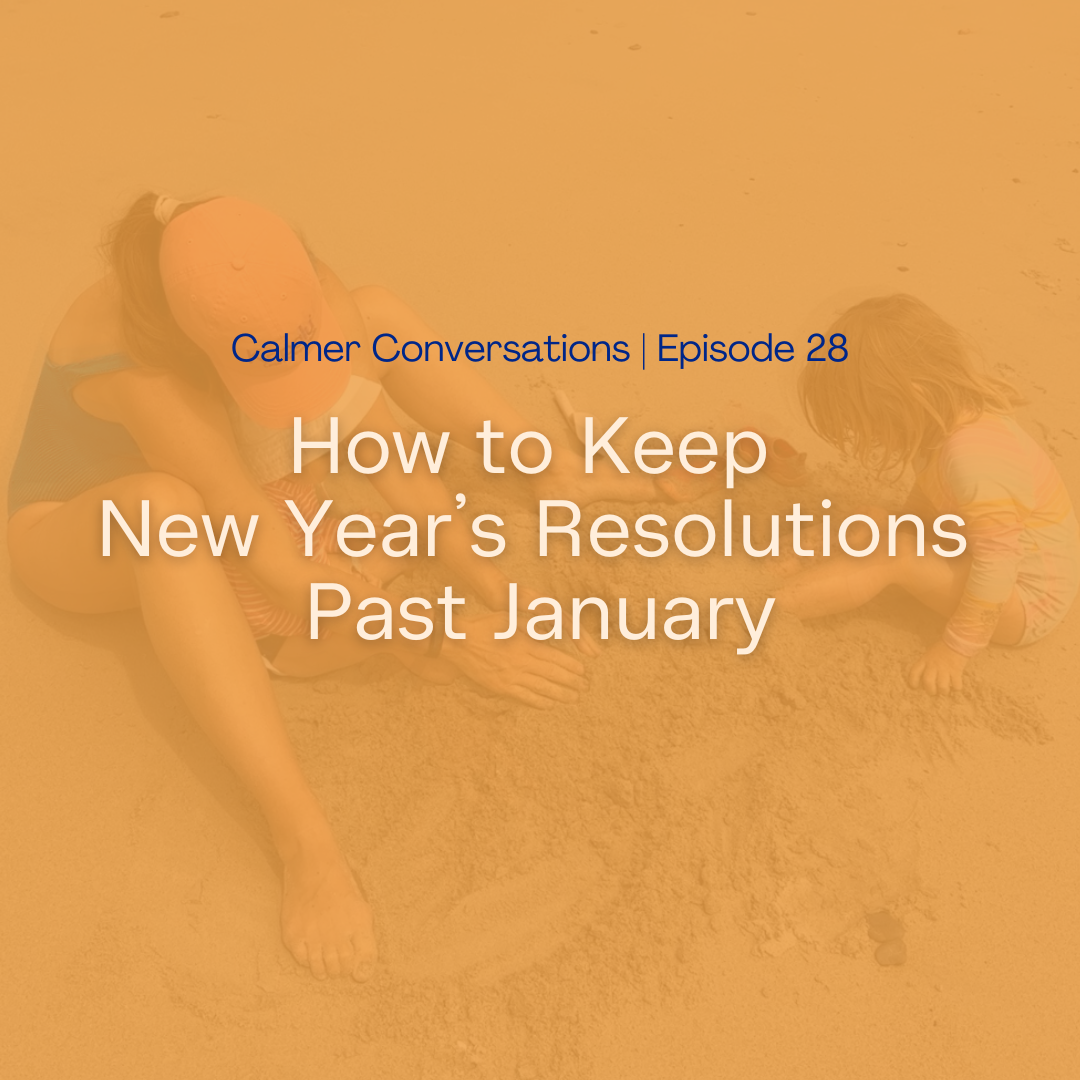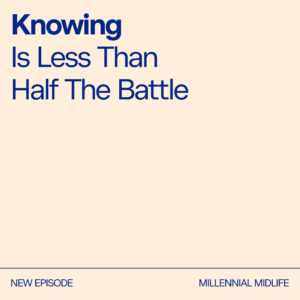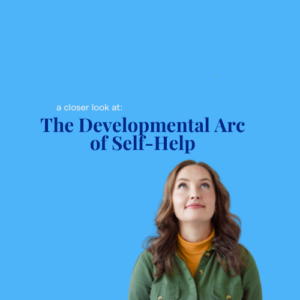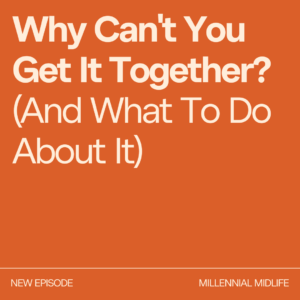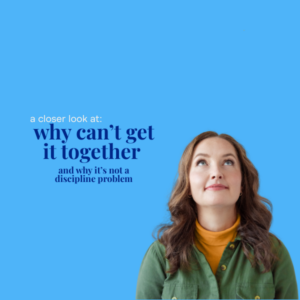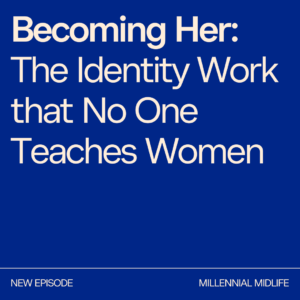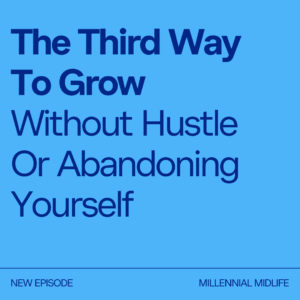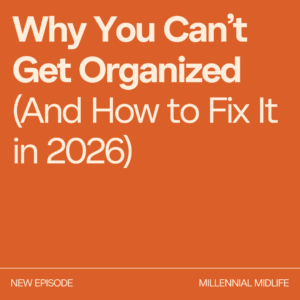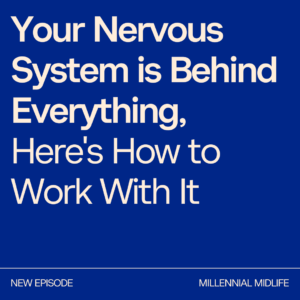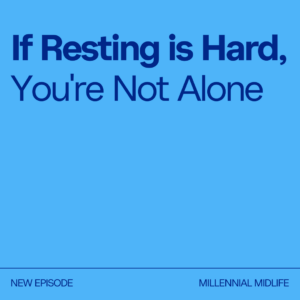Cecelia Baum Mandryk (00:01.006)
Hey, and welcome to Calmer Conversations episode. I believe we are on 28. I’m Cecilia, your host. am back after a holiday break, which was actually kind of fun to have a little while off and to think about all the topics I want to bring into the new year. So I hope that you’re, this is going to be airing about halfway through January. I hope that you are having an amazing new year so far. Happy 2025.
This is the time of the year when a lot of people drop their New Year’s resolutions. So they either drop them like the first day or they drop them about two weeks in. And so today I want to talk to you about how you might continue with these resolutions if you want to and any support that I can offer you. So this is the time of year when a lot of people make changes and I totally get the impetus to do that, right? It’s a new year, you feel like you have a fresh start.
It’s kind of like doing it on a Monday or the first of the month or the first of a quarter. You all of sudden you feel like, this is my chance to do something different. I will say that a lot of times when we’re using a date, there can be this background thing, and I didn’t even think about this until I started talking or started thinking about this episode a few minutes ago, or longer than that, about an hour ago, is thinking about how I’m going to become a new person on a new…
on this date. And I’m not going to talk about that today, but just notice if you have in your brain, you know, when the clock strikes midnight or on the first of the month or the Monday, this is my chance to become an entirely new person. That is something that’s in the back of a lot of people’s minds. It’s one reason why you’re probably thinking about giving up on your goal right now. And I saw this
quote from James Clear who’s the author of Atomic Habits if you’ve read that. It’s like one of the main habit books that people read. And he talked about how if your goals, if they are about you becoming a new person or becoming a new person doesn’t happen overnight. Becoming a new person happens step by step. And I 100 % believe that. And I think that’s really true. And as somebody who used to make perfect plans every single week and think I was going to become a new person on Monday, the reason why I wanted to do that
Cecelia Baum Mandryk (02:19.36)
is because at its core, I didn’t actually feel acceptable for who I was. So this is an entirely different episode that I’m going to talk about probably next week. But I just wanted to sprinkle that in there. So if you’re somebody who set this goal because you thought you were going to be a new person and then you’d be perfect and acceptable and wonderful and everything would go well in your life, just know that making goals from that place almost never works.
and you’re also perfect and acceptable right now. And if you can get your brain around thinking that you’re perfect and acceptable right now, being in that place, you’ll actually have an easier time reaching your goals. Okay, but what I really wanted to talk about right now, I just think it’s important to have that aside. What I really wanted to talk about today is trying to force new goals, trying to force change from a place of action.
Right now you’re probably thinking, duh, Cecilia, I’m trying to change my actions. Of course I’m using action to try to change. Of course I’m focused on action, right? Like, of course that’s what I’m looking at. And on one level, I really agree with you, right? Like, of course you might use action to change actions. We’re an action-based society. We really focus on doing. Oftentimes, if you are thinking about making a change, like for instance, maybe you want to get really strong and like have big muscles, you think, how do I do it?
If you want to become more organized or you want to stop procrastinating, your brain automatically goes to the how. What is the thing I need to do or stop doing to reach my goal? And on one level, as I just said, I’m 100 % with you. Action is necessary oftentimes to get to where we want to go. And if nothing else, action is like something to do with yourself and your time. However, action is just one component of it.
In reality the actions we take if you’ve been paying attention to the episodes you’ll this will sound familiar if you’re brand new here This is a really amazing concept to start to bring into your life. The actions you take are Driven by thoughts that you think and feelings you feel so the actions are actually the downstream thing if you want to think about this from a health perspective They’re like the symptoms Right. So the symptom of you hitting your hand with a hammer is that your thumb probably hurts right if you hit your thumb
Cecelia Baum Mandryk (04:30.382)
The symptom, the thumb hurting, is oftentimes what we’re trying to change or work on. But really, if you’re still hitting your thumb with a hammer, it’s gonna keep hurting, right? You have to change the upstream action. And I’m not gonna get into a whole medical thing here because we could easily have another aside. But just knowing that the actions or thinking of your actions, what you’re doing, so lifting weights, procrastinating, scrolling on your phone, drinking wine,
not recording the podcast that you want to record, those are all actions or inactions that you are taking. And the actions or inactions that you’re taking come from what you think and how you feel. So what you think, those are the lines of code in your brain and they drive how you feel and they drive what you do. So for instance, if you do want to record a podcast and if you do, the person who produces this, Haley, has a course, you could do that or you could work with her. So I’ll give a little plug there for her.
And she’s amazing and her team is amazing. So definitely consider working with them if you want to. But if you want to be recording a podcast, if you have this amazing idea, you have this topic that you love talking about, and it’s this goal that you have, and you’re thinking of all the actions you need to take. Like you need to enroll in Haley’s course and you need to buy the equipment and you need to do all this stuff, right? Those are just the, those are the pieces that make the podcast possible. But in reality, you have to
address the thoughts that are in your head that are keeping you from, that are stopping you from recording the podcast right now. So for someone that might be, I’m going to say something stupid, people are going to hear it and it’s going to be really embarrassing. Your brain, your primitive brain specifically, doesn’t like to be embarrassed. Embarrassed means that you might get thrown out of your tribe, right? Which leads to death. And so it’s going to keep you from recording the podcast because it doesn’t want to feel embarrassed and it doesn’t want the potential consequences from
being maybe found out by everyone around you, like a belief you have or some topic you’re really interested in. So you can try and change the actions. You can try to force yourself to record a podcast. But the fact is, if you don’t address those underlying thoughts, it’s going to be a battle. Like maybe you can get one podcast recorded. Maybe you’ll get two, or episodes, not that I get the episode podcast thing confused in my head all the time.
Cecelia Baum Mandryk (06:50.188)
You might record one episode, but you might have a hard time recording 10 episodes or 28 episodes or 392 episodes, right? And this is why people start quitting around this time in January. So they’ve had enough willpower to change their actions up until this point. So maybe that’s going to the gym. They’ve been able to force themselves and they’ve had a little bit of momentum, maybe from all the other people that are there to alter their behavior for some period of time, to force the behavior, to change the symptoms.
Right? And so they’ve done that. They’ve really worked hard there. But in reality, if you want to make whatever you’re doing a habit and you want to make it flow naturally, what you need to do
Cecelia Baum Mandryk (07:32.686)
You can cut that out. So if you want the habit to flow naturally, what you really need to do is you need to look at the underlying thoughts that are leading to the previous behavior. So for instance, not recording the podcast episodes, not going to the gym, and you need to see if you can change the thoughts and the feelings, right? So for instance, if somebody wasn’t going to the gym, because I guess embarrassment is the thing that’s coming up in my head today as I…
as I’m thinking through this episode, is that I might not know where the machines are, I might not know how to use them, or I might have a hard time finding a locker room and I don’t want to feel stupid at the gym. Everyone else there knows what they’re doing, they’ve all been there a thousand times, and I don’t want to be the newbie. And so your brain keeps you from going there. Or it’s going to be hard, right? Like, weights are heavy, right? And if you’re trying to build muscle, it’s going to be hard in some way. It’s going to be physically challenging.
And when it’s time to go, your primitive brain might just say, I’d really rather conserve energy and keep you safe, so let’s just sit on the couch and watch Netflix. That’s maybe what you have been doing. These first two weeks of January, you might have been able to force yourself to go to the gym, to change the downstream action. And if you want to keep going past the middle of January, if you want to make this a habit in your life, what I encourage you to do right now is to inquire about those thoughts that were leading to the other behavior.
and then ask, there anything else I could believe? What else might I believe that could help me move forward? So how can I create nervous system safety for myself? That’s another component, psychological safety for myself. And how can I even make this thing sound fun? Right, so you, I can’t tell you the answers to these questions because you have your own history, you have your own stories, and you need to figure out.
what your own brain, what your lines of code are. This is why being in a coaching space is so powerful because somebody like me or another coach can look at your lines of code that are leaning to your current actions. We can interrogate them and get curious about them and hold them compassionately together. Then you can try and change them. We can work on finding alternative thoughts for you. We can also work on connecting with your why.
Cecelia Baum Mandryk (09:52.404)
so that you are able to work with your primitive brain and your nervous system in the moment and you can keep doing the thing you want to be doing. And if you keep working with new thoughts, if you keep creating nervous system safety, what you end up doing is you create new neural pathways in your brain. We paired this with a few other things like feeling great after the exercise, et cetera, which kind of solidifies them in the brain. But the more you can…
can work with the whole pattern, the upstream pattern, the thought feeling pattern and change those, the more you can create nervous system safety for yourself, the easier the actions will be to take. In fact, the actions will generally just happen. I have clients say this all the time. We don’t actually end up talking about the actions very often. Sometimes we do, but the actions end up happening even if they’re not putting a lot of work into them. And that’s because we’re changing the root cause. We’re changing the contributing
factors that lead to how you behave in your life. The outcome of this is that change actually feels easier. So this thing that you’ve been trying to do for maybe years, like go to the gym or record a podcast or several episodes, actually just starts happening because you’re no longer fighting yourself. So when you’re trying to change the actions without working with your underlying thoughts and emotions and nervous system state is that you’re actually working against yourself. You’re swimming upstream.
And that’s going to always be hard. You’re always kind of fighting forces and these forces have a lot of power in the moment because it’s related to your survival. It’s related to your primitive brain and your safety, even though it might not feel like it’s related to your safety to your to this part of your brain it is. And ultimately those are going to win. They just will because your survival is so important to your to this part of your brain. So if you want them
if you want to make lasting change and you want it to actually feel a lot easier, I’m not saying it’s going to feel entirely easy and there is going to be work, just a different kind of work here. It’s not like a switch that you get to flip, although some people it happens really easily and readily. So it’s a different kind of work. But what happens when you do this is that the change flows. You start going with the flow. You start working with yourself. You start working with your brain and then the actions naturally come out of it. And
Cecelia Baum Mandryk (12:11.286)
Sometimes you find that the actions you thought you wanted to take aren’t the ones you want to take, but that’s again, whole nother episode. So if you’re having, if you’re getting to the point where you’re feeling like you want to give up on your new year’s resolution, I encourage you instead of using willpower to try and change things that you look at your thoughts instead. And I will just say, and this is something that kind of frustrates me about the habit kind of change vernacular that’s out there.
is that if you just do something enough times that it will become a habit. And I have found, and I’ll even speak very personally, is that if I was doing something to work against myself, I could use willpower for a really long time, long enough that it should have become a quote unquote habit, but it didn’t actually become a habit until I changed my thoughts around it. And so I think that if you’re naturally working against yourself, of course you probably can create habits. I’m sure there are cases of it, but that it’s actually…
very hard to do in general. Again, because the primitive part of your brain is so keen on keeping you safe, it’s so keen on conserving energy that it really has a lot of pull in the moment. And no matter how many times you kind of use your willpower to override it, ultimately it’s generally the one that quote unquote wins. Okay, so that’s your little tidbit on how to get started or how to keep going this January if that’s where you are.
I also wanna give a little plug right now in the middle of a 21 day challenge where I’m helping people use this method, working with your brain to make change in your life. And if this is something that you want support doing, this is an amazing way to kind of try this work out, to get a taste for it, to see if it’s for you, to see if it’s a way you wanna keep working with your brain or start working with your brain. if that’s…
on your radar. If it’s something that you haven’t tried before, maybe you have tried but you’re looking for support in a different way and for some reason I resonate with you, you like how I say things or how I work, come try this. I’m gonna, there will be a link in the show notes you can join. When you join you’ll get access to the days before. You can kind of just start wherever you are whenever you start and I promise that if you stick with it, if you stick with this method, even though it’s not forcing action change, you will see big changes in your life over the course of
Cecelia Baum Mandryk (14:27.006)
the 21 days and over a year, you will actually start to become the person you want to be, like the person who records podcast episodes regularly, or the person who lifts heavy weights and has big muscles. Whatever it is, you’ll turn into that person. But you have to start with your brain first. You have to become the person in your brain. You have to change the thoughts you have around that action that are holding you back and keeping you safe so that this comes easily. All right. It is, I feel like I was talking really fast during this episode, so I’m apologizing.
in advance if that is the case. It’s fun to be back. I found my microphone. I found my headphones, which is a little bit miraculous with little people. I still have a baby on me if you’re watching this. You can see little baby. She’s asleep. Happy holidays. I hope you had an amazing time in December. I’m so happy to be back and I’m thrilled to be working with you in 2025. All right. I’ll see you next time. Bye.

